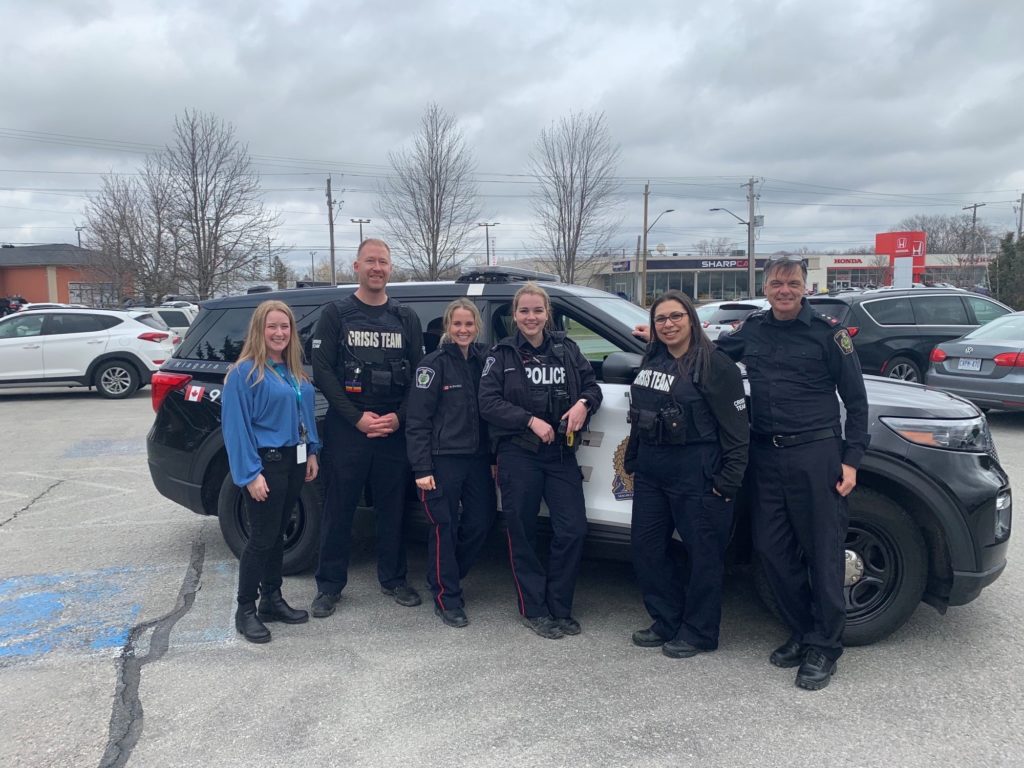Menu
Close
MCRRT expanding pilot program to Welland
21 April 2022

MENTAL HEALTH AND POLICE MOBILE CRISIS RAPID RESPONSE TEAM EXPANDING IN WELLAND PILOT PROGRAM
Pictured left to right: CMHA Niagara Immediate and Brief Services Manager Brandy Sand; CMHA Niagara Mobile Mental Health Crisis Worker Kevin Hicks; Inspector Pat McCauley; Constable Madeline Gurica; CMHA Niagara Mobile Mental Health Crisis Worker Vicky Looby; and Constable Maddison Mummery.
(St. Catharines, April 21, 2022) – The mobile crisis rapid response team program (MCRRT), has started a pilot expansion for the City of Welland and Town of Pelham following increased funding from the Ministry of the Solicitor General.
This valuable program is a partnership between Canadian Mental Health Association (CMHA), Niagara Branch and the Niagara Regional Police Service (NRPS).
MCRRT has proven to be an effective approach to de-escalating crisis situations, immediately assessing individuals’ mental health and addictions care needs, and connecting people with appropriate support services in the community. This co-response program partnership pairs a mental health and addictions professional with a specially-trained, uniformed officer to respond to 9-1-1 mental health calls.
The policing grant funding will allow for a one year pilot to determine impact and need in these areas of the Region to inform future advocacy for permanent expansion.
MCRRT has been active in St.Catharines/Thorold since 2015, and Niagara Falls/NOTL since 2021, with funding provided by Ontario Health West (formerly Hamilton Niagara Haldimand Brant Local Health Integration Network). Existing MCRRT teams are comprised of a full time mental health worker to work 12 hour shifts with police responding to 9-1-1 calls. The Welland/Pelham pilot funding will provide similar response.
Since 2015, MCRRT has responded to the growing number of mental health and addictions-related calls received by NRPS. In 2021, the service in St. Catharines and Thorold was extended to include Niagara Falls and Niagara-on-the-Lake. The latest data shows that MCRRT had 1,813 face-to-face visits with 1,376 people last year alone. Of those face-to-face interactions, 1,349 individuals (or 74%) were diverted from hospital.
MCRRT diversions led to 947 connections to various mental health or addictions services. Additionally, 1,299 of these interactions (or 72%) resulted in de-escalation without the need for police apprehension.
Between October 2015 and March 2022, MCRRT:
- Had 6,268 face-to-face interactions, serving 4,632 individuals
- Facilitated 4,302 connections to service
- Diverted 4,600 calls from hospital
- De-escalated 4,891 calls without apprehension
“This much needed expansion into our 3 District will allow us to better serve those residents living in Welland and Pelham during a time of crisis,” said NRPS Chief of Police Bryan MacCulloch. “As we have seen throughout the COVID-19 pandemic, in our community suffering from mental health and/or an addictions crisis have only grown. Building upon the success that we have observed in St. Catharines/Thorold and Niagara Falls/Niagara-on-the-Lake, we are looking forward to provide an enhanced and empathetic response to support people living in our community, at a time when they are most vulnerable.”
“We are grateful to our police partners for finding and securing this additional funding to support a pilot in 3 District, where police data indicates the program will be impactful,” said CMHA Niagara Executive Director Tara McKendrick. “We are confident that the program data will provide us with further evidence that ongoing additional investment in this program is supported by evidence, particularly in experience and positive outcomes for the individuals who benefit from this service. We continue to be hopeful that the successes will support an expansion of additional hours and availability across Niagara Region in the future.”
Resources Available:
The following resources are available in Niagara region to support people with mental health and addictions concerns or crisis.
- Urgent Support Services: Mental health counsellors provide same day service to individuals by exploring their immediate concerns and offering assistance with crisis management and problem solving. These services are available from 11:30 a.m. – 5:30 p.m. Monday to Friday. Please call (905) 641-5222, Ext. 2231.
- COAST (Crisis Outreach and Support Team): COAST is a 24/7 crisis outreach and intervention service offering immediate telephone counselling and on-site crisis outreach intervention as needed. Call 1-866-550-5205 ext.1 for 24/7 confidential support.
- Mental Health and Addictions Access Line: Provides support, information, and referrals to over 100 services available in Niagara. Call 1-866-550-5205 ext. 2 for 24/7 confidential support.
- 211: The 2-1-1 information and referral helpline connects people to needed community, social, government and health services. Dial 2-1-1
- Contact Niagara: Information and services in Niagara for local children and youth who have emotional, behavioural or developmental concerns. Call 905-684-3407 or 1-800-933-3617.
About Niagara Regional Police Service
Established Jan. 1, 1971, the Niagara Regional Police Service is the oldest regional police service in Ontario. In an area of 1,863 square kilometers, the Niagara Regional Police Service patrols one of Ontario’s largest geographic regions. The Niagara Regional Police is comprised of highly-trained and motivated individuals dedicated to serving and protecting residents and visitors within the Regional Municipality of Niagara. In partnership with the community, it provides quality policing services, with integrity, diligence and sensitivity.
About Canadian Mental Health Association, Niagara Branch
Canadian Mental Health Association (CMHA), Niagara Branch is one of a network of 67 branches, 11 Divisions, and 1 National Office that offer mental health services in communities across Canada. It was formed in 2001, as an amalgamation of CMHA St. Catharines and District Branch and CMHA Niagara South Branch. CMHA Niagara is recognized as a solid service provider and an effective contributor to the community mental health system. It has skilled staff and a good partnership of board, consumers, family members and professional service providers that ensures programs are current and as efficient and effective as possible.
